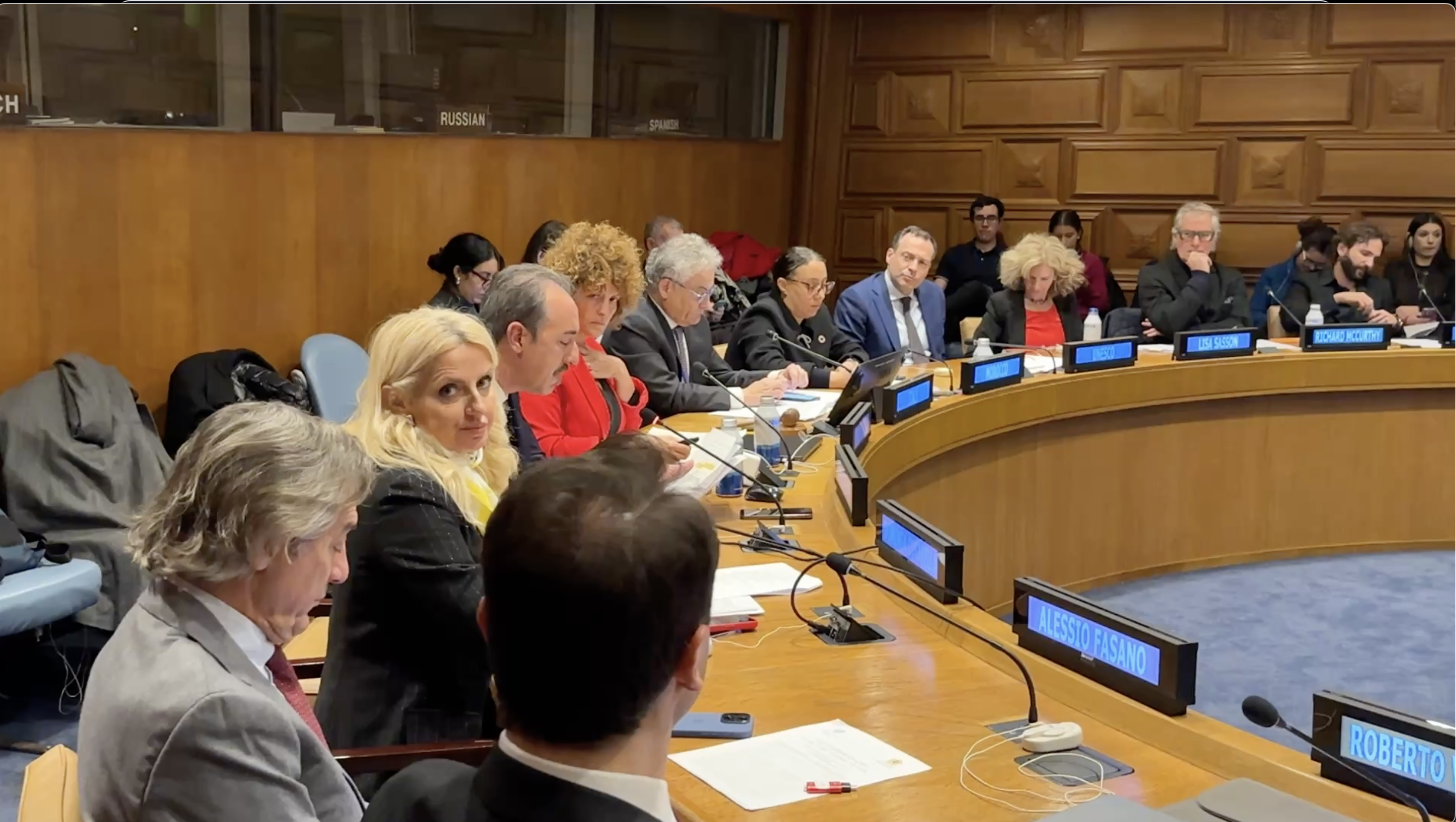NEW YORK – Institutionalizing the role of the Mediterranean Diet not only as a food model but also as a symbol of cultural identity and a tool for promoting environmental sustainability and global health. Representatives from FAO, UNESCO, and the academic world discussed this on Friday afternoon at the United Nations in New York during the event “Mediterranean Diet: A Living Heritage, Unleashing One Health,” organized by the Permanent Missions of Italy and Morocco, in collaboration with the Municipality of Pollica and supported by the Future Food Institute. The event marked the conclusion of the celebrations for the 14th anniversary of the Mediterranean Diet’s designation as an Intangible Cultural Heritage of Humanity by UNESCO in 2010.
“We have returned to the United Nations after two years to reaffirm fundamental concepts, but above all to bring an experience enriched by additional scientific evidence gathered over the past years. We have applied the ‘Mediterranean Diet’ model that we have developed over time, and today we can share its tangible results,” said Stefano Pisani, Mayor of Pollica, leader of the network of UNESCO Emblematic Communities, in the presence of Ambassador Maurizio Massari, Italy’s Permanent Representative to the United Nations, and UNESCO Director Eliot Minchenberg.
During the mission, Pollica, leader of the Strategic Master Plan for the Development of Southern Cilento, officially announced its candidacy for the UNESCO Creative City of Gastronomy, an ambitious project involving Southern Cilento as a pilot area. This initiative aims to promote the role of the “Lands of the Mediterranean Diet” as a global reference for the protection and enhancement of Mediterranean cultural and culinary heritage.
“Our work is perfectly aligned with the United Nations’ SDGs (Sustainable Development Goals), but what really makes a difference are practical actions,” concluded Pisani. “At the United Nations, we shared how we have moved from theory to practice through concrete initiatives such as our integrated urban planning, the Cilento South Master Plan, and innovative projects like the Mediterranean Diet Lab and the Mediterranean Diet Vineyard. These elements intertwine and transform into economy, development, and practical value, demonstrating the potential of the Mediterranean Diet as a model of sustainability and well-being.”
The support of the Future Food Institute and the network of UNESCO Emblematic Communities underscores the intention to consolidate Cilento as the heart of the Mediterranean Diet and a source of inspiration for the future of the planet. “The UN Summit is just one step in a long and strategic journey. For us, it’s not only about safeguarding the Mediterranean Diet, but also giving it concreteness, realizing the model, and passing it on to future generations. We are deeply convinced that the ‘Mediterranean Diet’ is a perfect model to achieve sustainable development goals, and our commitment is to transform it into a living and tangible legacy for the planet,” emphasized Sara Roversi, president of the Future Food Institute.
Additionally, the “Mediterranean Diet Presidia Worldwide” initiative was presented, celebrating cultural and gastronomic excellence linked to this living heritage. The first recipients were Pasquale Cozzolino, an Italian chef known for his “Ribalta” and “Amo” restaurants in New York, and Cilentans Rossella Episcopo and Emiliano Cammardella, promoters of the “Flora” project.
During the conference, Italy and Morocco also announced a resolution for the establishment of a World Mediterranean Diet Day. The proposal was made in the context of the ninth edition of the Italian Cuisine Week in the World and was supported by over 40 UN Member States, along with representatives from UN bodies such as FAO, WFP, IFAD, and UNEP.
“The Mediterranean diet has a lower environmental footprint compared to many other diets, and it is no coincidence that it is our ally in accelerating the implementation of the UN 2030 Agenda,” noted Massari. “Faced with challenges such as climate change, urbanization, and concerns about global health, the Mediterranean Diet stands as a model for the entire world. It is this model that inspires Italy’s action in the field of nutrition at the multilateral level, as demonstrated by the Apulia Food Systems Initiative during our G7 Presidency and the work Italy is carrying out at the UN, also as President of the UN Group of Friends of Food Security and Nutrition, which includes over 50 countries.”
The event also included participation from Omar Hilale, Ambassador and Permanent Representative of Morocco to the United Nations; Maurizio Martina, FAO Deputy Director-General (remotely); Pier Luigi Petrillo, Full Professor of Comparative Law of Cultural Heritage (remotely); Mohamed Chahboun Sefiani, Mayor of Chefchaouen (remotely); Elisabetta Moro, Director of MedeatResearch and Full Professor of Cultural Anthropology at the University of Suor Orsola Benincasa in Naples (remotely); Lisa Sasson, Associate Dean at NYU; Richard McCurthy, World Farmers Market Coalition; Dominga Cotarella, President of Terranostra and Intrecci; Alessio Fasano, Professor of Pediatrics and Nutrition at Harvard Medical School; Roberto Vicinanza, Associate Professor of Gerontology at the University of Southern California; Barbascura, Influencer and Climate Activist; Eugenio Russo, School Engagement Lead at Paideia Campus.

